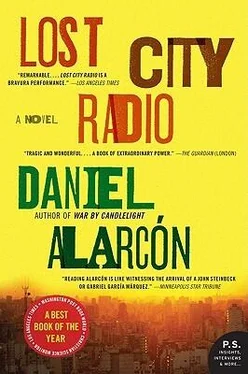“This is where we lived,” Rey said, ignoring her, “when we first came to the city.” He pointed at the second-floor window of a green house. “Don’t you want to see it?”
“No,” she said. “Not really.”
His face fell into a sad smile. He was hurt.
“You look tired, honey,” Norma said. “Let’s go home.” By home, she meant the room he rented near the university. She slept there some afternoons, into the early evening, then took a bus to her parents’ house, crawled into her own bed, and stayed up thinking of him. Now Norma pulled close to Rey, stood on her tiptoes to kiss his temple. “Are you still having the nightmares?”
“Not so bad.”
“When are you going to tell me,” she said, “when are you going to tell me what they did to you?”
Now Rey frowned, then caught himself. “When we’re married,” he said.
NORMA HELD Victor until his breathing slowed. He looked at her with needy eyes, then shut them tight. “Are you okay?” Norma asked, but Victor didn’t want to talk. He wanted to sleep again, he said, if he could. “Do you want me to stay here?” Norma asked, and the boy said he did. She lay beside him on the couch, he was thin, after all, and the two of them fit snugly. He buried his face in her side, and she let him be. After a while, Victor was asleep again. She’d wanted to ask him what he had dreamed, but somehow it seemed wrong. In a strange place among strange people, he had the right to private nightmares.
She rose again at daybreak. Without waking Victor, Norma made her way to the kitchen to brew some coffee. She turned on the radio, just low enough that she could hear the crackle and hum of the signal, the morning host’s raspy voice reading the news. They would have to be at the station in a few hours, she and Victor, and God knows what would be waiting for them. Not for her, she was safe, for the boy. Elmer had promised a tearjerker. She looked back into the living room. The boy was still asleep. Even at this early hour, they were planning things for him, even as he slept. It’s no wonder he was having nightmares; it must not be hard to sense your own helplessness. He must have known yesterday at the station, and later, when he darted off the bus. Poor boy, poor family, poor friends that had believed the lie of her affection and sent him here, sent him to her. How do you tell them it’s a show? Lost City Radio is real, but not real. That honey-voice wasn’t something she controlled, it simply was. The morning newsreader, her replacement, droned. He had no charisma. An emergency landing in Rome without casualties, a tropical depression threatening to erupt into a hurricane, the findings of a study about the causes of diabetes. She couldn’t help but think of the ways her reading would have been different, better. Locally, there was nothing: potholes filled with great fanfare, ribbon-cutting ceremonies planned for newly painted buildings, a famous writer caught with a prostitute down by the docks. In Miamiville, an overnight fire had destroyed a house, leaving seventeen people homeless. Faulty wiring, the newscaster read. Then he cleared his throat, moving on — had she heard right? Norma was struck with the image of a smallish house in that district, expelling seventeen people from its flaming shell. Seventeen people? she thought. She sipped her coffee and counted them on her fingers: a father, a mother, four kids, a grandmother who spoke only the old language, an uncle, an aunt, four more kids, a cousin just visiting with his sometime girlfriend, a distant great-aunt’s favorite nephew and his pregnant wife, and how many more? An entire village would be on the sidewalk now, on the streets, Norma thought. They would sleep in the park, all of them, or on the rocky beaches with whatever blankets they had salvaged, with whatever trinkets to remind them of the life they’d once had. It made Norma shudder. They’d shake off the ashes and stay together, they have to: once separated, a family can never be made whole again, not here. They’d disappear like trash scattered in the breeze.
Norma’s own family wasn’t like that, no extended lineages or childhood memories crowded with cousins. No one to disappear on her. Her recollections of family were oppressively small: just her and her parents. She could count their dislike for one another as a separate person, a monster that stalked them, or she could count them each twice: the people they were together — disfigured, unhappy, resentful — and those they might have been if they had not married each other. Or, if she were really intent on expanding the family tree, she could count her father’s mistresses as well. There were a dozen of these well-dressed, dark-haired women Norma’s mother hated and envied, and Norma simply hated. They came and went, changed names and faces, but Norma was aware of them always: their perfume, her father’s guilty grin.
Only Rey had a smaller family: he was the only one left. His mother had died so young Rey scarcely remembered her at all, and Rey’s father, he’d told her, died a few years after they moved to the city. No brothers or sisters. Rey had lived with his uncle Trini after that. But who knew really? He played tricks with the past; he always had. If he is alive, she thought, he might still be at it, even now. That cold, dreary day at the door of his first home in the capital, Rey had insisted they knock, just to see. Norma hadn’t been so sure.
“Do you remember anybody from the block?” Norma asked. “Will they remember you?”
He shrugged. “I’ll tell them I used to live here. It’s no big deal.” He seemed sure that it would be enough. “That, plus my smile, plus this beautiful young lady.”
Norma blushed. The steps creaked as they climbed to the second-floor landing.
Rey made her knock. The door was old, made of wood that had swelled and shrunk and aged with decades of summer heat and humid winters. It was somehow illicit, her being there, on the wrong side of town, knocking on a stranger’s door, visiting the museum of her lover’s early life. She kissed Rey; she knocked again. On the other side, Norma could hear a slow shuffling of feet and the metallic click of a few locks. It seemed the door was about to open, but there was a pause. “Yes?” a voice called out. It was the airy, weak voice of an old man. “Who is it?”
There was silence. Rey grinned, but he didn’t say anything. Norma elbowed him. “Come on,” she whispered. Hadn’t he dragged her up here?
“Who is it?” the old man repeated, confusion in his voice. Rey made a show of zipping his lips. Norma could feel herself turning red, aghast at the rudeness of it. She wanted to laugh. “Say something!” she hissed, but he cupped his hand to his ear as if she were calling him from far away.
She cleared her throat and was about to speak, but Rey covered her mouth with his hand.
“Father,” he said. “It’s me, Rey.”
MIDMORNING FOUND Norma and Victor in the control room, wearing ancient headphones, listening to the sounds of actors straining to imitate the jungle accent. A string of them had come and gone. They had plied Victor with candy and pastries and toured him around the station as if he were royalty. Everything else seemed to have been quickly forgotten. Still, here they were, the red lights on the console rising and falling to the rhythms of the actors’ voices, Len in the sound booth, furiously typing out his inimitably melodramatic scripts. Elmer surveyed the room the way a duke might observe his duchy. Behind the smudged glass, a sad-looking man read about leaving his village to work on the dam, only to have it destroyed in the war. He was an actor, of course. “Bombs!” he shouted. “The sound drowned—” He stopped and coughed into his hand. “Is this right?” he asked. “It doesn’t sound right. Who wrote this?”
Читать дальше












